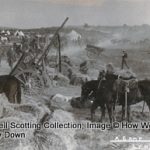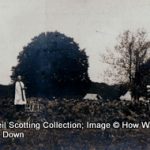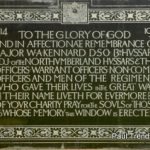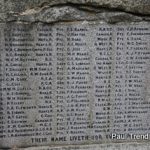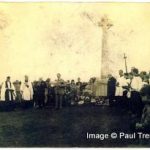Life in Lyndhurst in the Great War
What is special about the civil parish of Lyndhurst?
Lyndhurst was an important training and gathering place for troops, this was especially true in the Great War. Camps were established on The Race Course and The Bench before embarkation overseas; troops were billeted with local families; Bombing and Trench Mortar Schools and a War Dog Training School were based nearby.
The ‘Immortal’ Seventh Division camped in and around Lyndhurst in September/October, 1914—a plaque in Appletree Court commemorates them. A memorial window in the Roman Catholic Church is dedicated to Major W.A. Kennard DSO, 13th Hussars, Adjutant of The Northumberland Hussars and to the Officers, Warrant Officers, Non-Commissioned Officers and men of that Regiment who gave their lives in The Great War.
Lord Moulton (John Fletcher Moulton), Director-General of Explosives, Ministry of Munitions, 1914-1919, lived in Bank, Lyndhurst and is buried in Emery Down Churchyard. Read about him at the Internet Archive.
Everyone Did Their Bit
The Great War affected both rich and poor; the whole nation became involved. Many families lived in this locality all their life, married, and were related to many other families. The death of one man could affect several families as a grandson, son, brother, cousin, nephew, uncle, father, friend or workmate. On the Home Front people worked together to support the men on the Front and care for the wounded.
The involvement of everyone and the bond that villagers had for relatives and strangers alike during the Great War is evident in the following extracts from the archives of the Christopher Tower New Forest Reference Library at the New Forest Centre in Lyndhurst:
“WHERE GOOD-BYE IS SAID. Visit to the Camp in the New Forest. The Commonplaces of Farewell. (From Our Special Correspondent.) LYNDHURST (Hants). This normally peaceful little place in the New Forest is having a surprising time. For the last three weeks the military have taken possession of it, and it is impossible to get a bed, or to be shaved, or even to buy a stamp unless you are willing to take your place in a queue of soldiers. It would be indiscreet, perhaps, to say exactly how many are concentrating here before being shipped to the front, but there are many thousands from various parts of the world, and the landscape for miles is dotted with their tents. … The Common-places of “Good-bye.” The hotels were full after the first few days of the concentration, but the people of the little town threw open their houses, and soon there was not a bed or a couch that was not occupied. It is not exactly a place for laughter. The platform of the railway is rarely without officers or men seeing someone off, say the last few desperate commonplaces, and then striding off to escape into the reassuring bustle of the camp. A Wednesday in September 1914. Extract from an undated newspaper cutting.
“The Parade Services I held while at Lyndhurst were an inspiration. The prayer card issued by the Chaplain-General was greatly appreciated by officers and men. I arranged for the distribution of 15,000 of them in the Division, and they were eagerly accepted by all from the Generals downwards. On many an occasion in the after days I came across these cards tucked away in the lining of the caps of dead and wounded men.
“They were happy days at Lyndhurst, where the [7th] Division remained for a fortnight. The future stress of awful losses was only a bare possibility then, although it was on the horizon of many men’s hearts; but at the time it was ignored, for many of the officers had their women folk staying, either in the village, or near at hand; and the lawn of the ‘Crown,’ the Divisional Headquarters, was a bright and happy centre of pleasurable intercourse.” From: With The Immortal Seventh Division by the Rev. E.J. Kennedy, Chaplain Major to The Expeditionary Force, also available online at the Internet Archive.
WAR RELIEF FUND. Six guineas were given from the Church funds and upwards of six pounds from the proceeds of a concert were sent from this parish to the War Relief Fund.”
“OUR HARVEST THANKSGIVING SERVICES. … we owe God our deepest gratitude … for the way in which the Navy has kept open our trade routes, and protected our shores, and for the wonderful way in which this war has united the various peoples of our mighty Empire together in the bonds of loyalty and patriotism. … no country has been treated with more wanton cruelty … than poor innocent Belgium, whose sufferings have stirred our deepest feelings of sorrow and indignation. We have therefore decided to … give our alms at the Harvest Festival to the Belgian Refugee Relief Fund …”. New Forest Magazine (NFM) October 1914 – Emery Down.
“WAR BABY SCARE. It is satisfactory to note that the number of illegitimate children born in this Sanitary District during the past year has been much the same as in former years. It will be remembered that the 7th Division was stationed in this District for some months, and throughout the year some thousands of troops have likewise camped in the District; and it was publicly stated that illegitimacy would go up by leaps and bounds. It is therefore a pleasure to me to be able to remove so serious an allegation which was put upon a well-behaved body of men and equally upon the younger women of the community.” Annual Report on Vital Statistics and Sanitary Condition 1915, submitted by Medical Officer of Health, Dr. Henry Anderson; New Forest District Council – Sanitary Authority.
“FRUGAL WOODMEN – PORTUGUESE TREE FELLERS IN NEW FOREST. Away in the heart of the New Forest, rather off the beaten track, is a tiny Portuguese colony, self-contained, industrious, and contented. … Weeks ago men from Portugal were set down here to cut timber for the Home-Grown Timber Committee, and if you have good eyesight you can see them looking in the distance no bigger than ants, moving among the trees they have felled. More than a hundred years ago the New Forest … gave thousands of loads of oak and beech for the building of warships. To-day it is giving vast supplies of pine for the trenches in France.
The colony is not large – 26 men in all – but in five weeks these men have cut down and prepared for use nearly 16,000 trees. In appearance they are young, dark, and handsome, of medium height, and not imposingly robust; but they are splendid woodsmen; quick and thorough. Already they have made huge inroads into the plantation called Slufters, which was given into their hands, leaving vast open spaces strewn with the dismembered stems and little of fallen trees. They are hard-working and frugal. Their working hours are from dawn to dusk, and when the day’s toll is over they show no inclination to wander from the plantation. Their wants are few. Meat has now place in their diet. They are satisfied with bread, potatoes, salt cod (‘bacalhau’ they call it), and only water from a brook beside the wood; and not more than five or six of them are smokers. A few shillings a week cover the whole cost of their simple but strenuous life, and the rest of their earnings go home to Portugal to form funds for the purchase of parcels of land on which some day they hope to settle down. A FOREST EXPRESS. Not far from Slufters, in a plantation more prettily named – Highland Water – soldiers and Irishmen are plying the axe and the saw for the good of the nation. You come quite unexpectedly upon the signs of their presence as you are walking along a lane a few miles from Lyndhurst. Emerging from a narrow, sunspangled glade a single diminutive railway track comes through the tall bracken and forms a loop beside the road. … Here and there, gradually gnawing their way into the plantation, are other parties of soldiers and labourers brought from Ireland; some felling trees, some cutting them into trench and pit props, poles for wire entanglements, and pickets, some piling up the brushwood for burning. … In this plantation, out of about 450 acres of Scots fir, some 300 acres are to be cleared; and it is anticipated that when the work here and at Slufters is in full swing the two plantations will yield 500 tons of timber a week. These, however, are only two out of a number of lumber camps established in various parts of the New Forest and in the private estates adjoining it. Saw mills have been set up in several places, and Canadian lumbermen as well as English sawyers are at work through all the hours of daylight, helping to keep pace with the demand for timber not only at the front, but in the collieries at home. The Times, Monday, July 24, 1916.
“WAR NOTES AND NEWS. The Secretary of the Lyndhurst War Savings Association will be at the Parish Room every Wednesday from 5 to 5.30 to receive subscriptions of 6d. or upwards. Mr. Lloyd George reminds us that every penny lent to the Government at this time will ‘back up our brave young boys’ at the front and help to end the War”. NFM February 1917 – Lyndhurst.
“An interesting article appeared in The Times of December 6th on the collection of horse chestnuts for munition making. The writer says that 36,000 people made collections, … that the collectors were mainly children and that Lyndhurst , Minstead, Emery Down and Bartley between them sent 17 cwt. 23 lbs. Sir Louis Dane had allowed his stables to be used to spread them out for drying, to prevent them heating. Acorns had also been collected in response to an appeal from the Admiralty but this was less successful as only Lyndhurst and Emery Down had responded to the appeal. They collected and sent 26 bushels and Sir Louis Dane again lent his stables for spreading, turning and drying the acorns.” NFM January 1918 – Lyndhurst.
“We are asked to abstain from writing depressing letters to our soldiers at the front. It is surely up to us at home to bear our small privations without complaint. By writing to our soldiers about them we only depress them and don’t help ourselves”. NFM May 1918 – Emery Down.
“Hampshire Regt. Prisoners of War Fund. Letters and receipts have been received from the Committee for the above Fund acknowledging £99 13s. 11d., the amount collected in Lyndhurst, and their appreciation of the efforts which the collection of so large a sum must have entailed”. NFM August 1918 – Lyndhurst.
“IMPORTANT NOTICE. The Ministry of National Service desires to direct attention and to make it widely known that, whereas there are a considerable number of men over military age employed in keeping lawns and flowerbeds in order, it is most needful that as many as possible of such men should be allowed to assist in the more important work of agriculture at least up to the end of the harvest. It is hoped therefore that, having regard to the food position and the crisis through which the country is passing, all employers will do their utmost to release such men for work in the harvest fields”. NFM September 1918 – General Section.
“VEGETABLES FOR THE FLEET. A special notice has been sent that Vegetables are needed for the Fleet. The Lyndhurst Depot is at Brooklands Stable Yard where vegetables are received on Wednesdays at 3.30.
AN APPEAL. The Director General of National Salvage urgently asks the public to save all kinds of fruit stones and nutshells, which are needed for making the charcoal used in anti-gas masks. They must be thoroughly dried before storing. Miss Sykes, Elcombs, Lyndhurst, will be pleased to receive any quantity and will forward them from time to time.” NFM September 1918 – Lyndhurst.
“DOGS IN BATTLE – MESSENGERS, SENTRIES AND GUARDS. In the early months of 1917 a War Dog School of Instruction was formed by the War Office and Lieutenant-Colonel Richardson, who has devoted his life to training dogs for military and police purposes, was appointed commandant. The school started at Shoeburyness, but was recently moved to Lyndhurst, Hants. Gamekeepers, hunt servants, and shepherds were called up from the Army to be instructed and to assist in the instruction of the dogs. At first the dog recruits came entirely from the Battersea, Birmingham and Liverpool Homes for Lost Dogs, and many a dog has thus been saved from the lethal chamber, and has done excellent national work. … The police have also been of great assistance in sending unclaimed dogs, and finally the public were appealed to for gifts of dogs. … The skill, courage and tenacity of these dogs has been have been amazing. During heavy barrages, when all other communications have been cut, the messenger dogs have made their way, and in many cases have brought messages of vital import. Sometimes they have been wounded in the performance of their duties, and there is a wonderful record of the determination with which wounded dogs have persisted in their duty. In the same way, the record continues of successful message-carrying through darkness, mist, rain, and shell-fire, and every sort of difficult ground. … a dog ran six kilometres in 20 minutes, while in another case a dog carried back a map of an important position in 20 minutes when a man would have taken an hour and a half to bring it in. … The breeds that have given the best results for this work have been collies, sheep dogs, lurchers, and Airedales, and crosses of these varieties, while in several cases Welsh and Irish terriers of the large type have given excellent results. … In conclusion it may be said that the dogs all love their work, and have ideal surroundings at the training ground in the New Forest glens and glades. Here unvarying kindness and devoted service govern their management.” The Times, Monday, December 9, 1918.
“On St Martin’s Day, November 11th 1918, a day which will surely be memorable in the annals of history, the joyful news reached Emery Down between noon and 1p.m. that the armistice had been signed at 5 a.m. and that the terrible awful struggle had ceased at 11 a.m. Right had conquered over Might and the hearts of all overflowed with gratitude to God”. NFM December 1918 – Emery Down.



